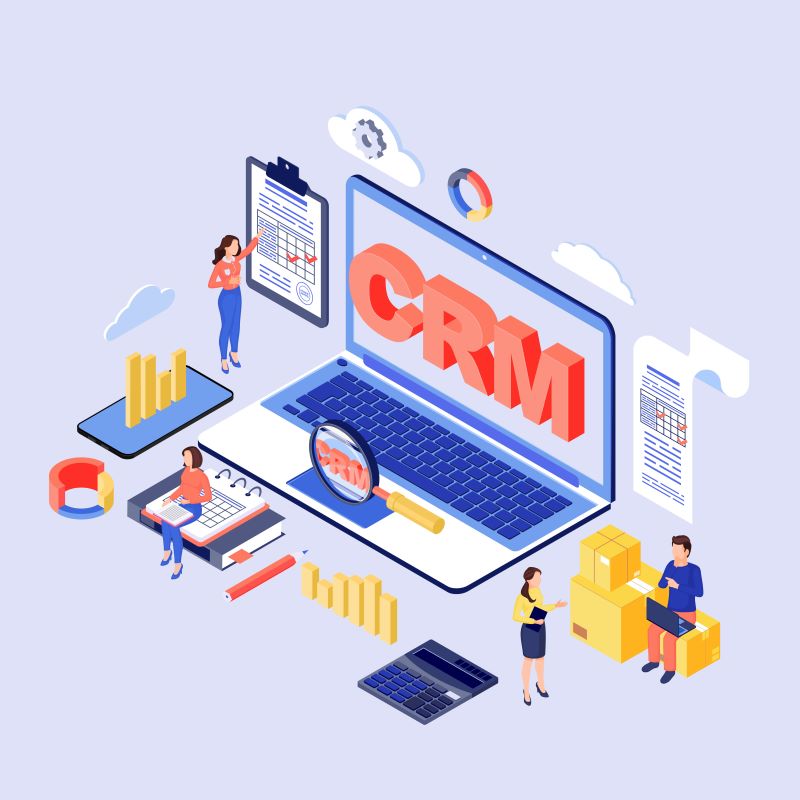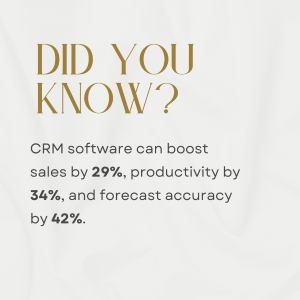As the saying goes,
Instead of focusing on the competition, focus on the customer.
This quote is valid for any business, especially in today’s competitive landscape. Customer experience is no longer a differentiator; it’s the foundation for success. In 2025, businesses using CRM software see an average 41% increase in revenue per salesperson and 47% improvement in customer retention rates.
Why Customer Experience Matters?
A positive customer experience directly impacts your bottom line. Studies show it improves customer retention, increases revenue, and boosts sales productivity. However, delivering exceptional customer experiences requires a deep understanding of your customers and their needs.
This is where Customer Relationship Management (CRM) software comes in. CRM software goes beyond simply managing customer data. It’s a powerful tool that helps you build stronger customer relationships.
What is CRM?
A CRM centralizes and securely stores all your customer interactions and data in one place. Imagine having a complete picture of each customer, including their communication history, purchase behavior, and preferences. The software empowers your team to personalize interactions, anticipate needs, and, ultimately, provide exceptional service.
It replaces the need for different spreadsheets, modules, scattered notes, emails, and apps, as all the information in the CRM software is stored in a centralized database.
Let’s see the benefits of CRM software that help grow your business and how its features can be used in your daily activities.
How CRM software can benefit your business?
1. Manage Communication with Centralized Data:
Struggling to Find Customer Information?
Imagine this: You need a crucial piece of customer data that is lost in spreadsheets, emails, and documents.
Does this sound familiar?
Many businesses struggle with scattered customer information and waste valuable time searching when they should focus on building relationships.
Here’s how CRM software solves this problem:
- Centralized Data: CRM provides a single, centralized source for all customer and lead information. You need not search endless spreadsheets or emails.
- Easy Access: Every team member can access the needed data, fostering better collaboration and faster response times.
- Powerful Search: Find exactly what you’re looking for with robust search and filter functionalities through a large set of databases.
2. Automation:
Problem: Do your team members spend hours on repetitive tasks like sending weekly newsletters, lead nurturing emails, setting follow-ups, etc.? This wasted time could be better spent building on closing deals.
How does CRM software automate work?
- Free Up Your Team’s Time: You can set up automated email campaigns, follow-ups, and reminders, saving your team valuable time.
- Automate Scheduling: Schedule tasks and events automatically based on triggers, like customer purchases or signup dates.
Imagine the possibilities:
- Weekly newsletters sent automatically, keeping your audience engaged.
- Personalized follow-up emails or marketing offers triggered by customer actions, nurturing leads and boosting conversions.
- Automatic task creation for demos or meetings, ensuring a seamless sales process.
With CRM automation, your team can focus on what matters most.
3. Personalized Campaigns:
Personalize Your Marketing with CRM
Keeping your customers engaged is crucial, but blasting generic emails to everyone isn’t practical.
The Problem: Spreadsheets Limit Personalization
- Struggle to Segment: Categorizing leads, customers, and inactive users in spreadsheets becomes messy.
- Generic Messaging: Sending the same message to everyone yields poor results.
CRM Software: Helps with Personalized campaigns
- Smart Segmentation: Use tags to categorize contacts by lead status, demographics, interests, product usage, etc.
- Targeted Campaigns: Craft personalized email offers and promotions, tailored to each segment’s specific needs.
- Automated Engagement: Schedule campaigns or set up automated triggers to stay connected effortlessly.
The Result: Stronger Relationships, Higher ROI
Imagine:
- Sending targeted welcome emails to new customers instead of generic emails.
- Offering special discounts to inactive customers to re-engage them.
- Recommending relevant products based on a customer’s purchase history.
- Sending discounted offers on new product purchases will attract leads and improve conversions.
CRM empowers you to create personalized campaigns that resonate with your audience, leading to higher return on investment. Our OfficeClip customer Sarah Chen increased her email campaign ROI by 300% using targeted segmentation and Campaigns feature.
4. Follow-Up:
Never Miss a Lead (or a Sale) Again!
Managing a large customer base can be a juggling act. Tracking follow-ups with individual leads or customers becomes challenging, potentially leading to missed opportunities and lost sales.
CRM software follow-up feature!
- Stay Organized: Schedule follow-up calls directly within the CRM. No more scrambling to remember who to contact next.
- Prioritize Effectively: CRM helps you prioritize your follow-ups based on urgency or potential deal size, ensuring you focus on the most important leads.
- Boost Conversion Rates: Prompt and consistent follow-ups with leads nurture relationships and increase the chances of closing the deal.
How convenient it is when:
- Automated reminders remind you to follow up with a promising lead.
- You get a clear call list prioritizing contacts based on urgency and potential value.
- Increased conversion rates thanks to timely and personalized follow-up with leads.
With CRM, you can ensure no lead falls through the cracks, maximizing your sales potential.
5. Actionable Data Insights:
Making data-driven decisions is key to business success. However, analyzing customer data can be complex and time-consuming without the right tools.
CRM software empowers you with real-time customer insights.
- Understanding Buying Patterns: CRM software will help to analyze customer purchase history to identify trends and predict future behavior.
- Predict Customer Needs: Go beyond basic recommendations and suggest products or services that complement their purchases.
- Know Your Customers, Grow Your Business: Use customer data to make smarter choices about marketing, sales, and product development.
- Boost Customer Satisfaction: By understanding their behavior, you can personalize communication and offers, leading to happier customers.
With detailed analysis you can:
- Recommend a new laptop case to a customer who recently purchased a laptop.
- Identify customers likely to be interested in a new product launch based on their past purchases.
- Tailor marketing campaigns to specific customer segments based on their buying habits.
By harnessing the power of customer data in your CRM, you can create a more personalized and profitable customer experience.
6. Customer Retention:
Turn Frustrated Customers into Loyal Ones
Imagine a system where customers can easily submit questions, report issues, and provide feedback. That’s the power of CRM’s built-in ticketing system!
How CRM helps you retain customers through better service:
- Effortless Issue Tracking: Customers can submit tickets directly through the CRM, streamlining communication and resolution.
- Prioritized Support: Teams can assign priority levels and track ticket status, ensuring urgent issues are addressed first.
- Faster Resolutions: Efficient ticket routing gets the right people working on problems, leading to quicker solutions and happier customers.
The result? Customers feel valued and heard, fostering loyalty and bringing them back for more.
7. Team Collaboration:
All your customer data is in one place, accessible to everyone on your team. Imagine if a customer calls, and your support rep can instantly see the last five emails from the sales team, eliminating the need for the customer to repeat their story. No more wasted time searching for updates and getting things done easily. That’s the power of a CRM’s centralized database.
Here’s how CRM streamlines communication and collaboration:
- Everyone is on the same page: All customer data and updates are stored in one central location, accessible by every team member. There is no more scrambling for the latest information.
- Improved Transparency: Everyone on your team has a clear view of customer interactions, history, and preferences, fostering better collaboration.
- Reduced Communication Silos: Streamlined communication tools within the CRM allow teams to share updates and collaborate seamlessly.
The result? A more efficient team, better customer service, and a smoother overall operation.
8. Improved Conversions:
Turn Website users into Loyal Customers
Imagine a potential customer browsing your website. They’re interested but need more time to be ready to buy. With CRM, you can turn that interest into a sale.
Here’s how CRM helps you convert more leads into customers:
- Personalized Engagement: CRM captures lead information and tracks their journey. This allows you to send targeted emails, offers, and promotions based on their needs and interests.
- Right Message, Right Time: Send relevant content at the perfect moment in the buying cycle. Imagine offering a discount on the exact product a lead has been researching!
- Streamlined Sales Process: CRM automates tasks like follow-up emails and appointment scheduling, freeing your sales team to focus on closing deals.
The result will be more qualified leads, higher conversion rates, and a thriving customer base.
9. Customer Feedback:
Your CRM isn’t just for storing data—it’s a powerful tool for gathering valuable customer feedback. Customers can easily share their thoughts and experiences through web forms or the ticketing system.
This feedback is a precious resource as it helps you understand customer pain points, preferences, and feature requests. By analyzing this data, you can identify areas for improvement in your products or services, prioritize features based on customer needs, and ultimately create offerings that resonate better with your target audience.
Use this insight to prioritize your product roadmap and development efforts.
Feedback allows you to identify areas where your customer experience falls short. You can then use this information to streamline processes, personalize interactions, and address customer concerns promptly. This leads to a more positive customer experience, increasing customer satisfaction and loyalty.
Conclusion:
CRM software is a powerful tool that empowers all your teams to work smarter and achieve better results. Here’s how:
- Sales: Target the right audience with detailed customer profiles, personalize outreach, and streamline the sales process for faster conversions.
- Marketing: Create focused campaigns based on customer behavior and preferences. CRM helps you deliver the right message to the right person at the right time.
- Development: Build products your customers love. Analyze customer feedback within the CRM to understand their needs and prioritize genuinely important features, leading to innovative and well-received products.
- Customer Support: Deliver exceptional service. CRM keeps track of all customer interactions, equipping your support team with the context they need to resolve issues quickly and efficiently, fostering customer satisfaction and loyalty.
The software will lead to a unified team working towards a common goal – building stronger customer relationships and driving business growth.
Data source:
Note: This blog was published in 2024, and has been updated.
Deepa Kapoor is an online writer for small businesses. She loves to write on the advancements of new technologies and how it affects our lives. She always explores ways to make small businesses more profitable. When not writing, she enjoys reading books and cooking exotic traditional food.








